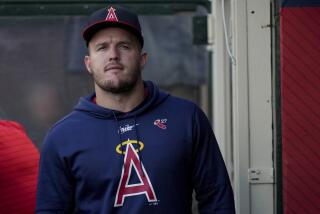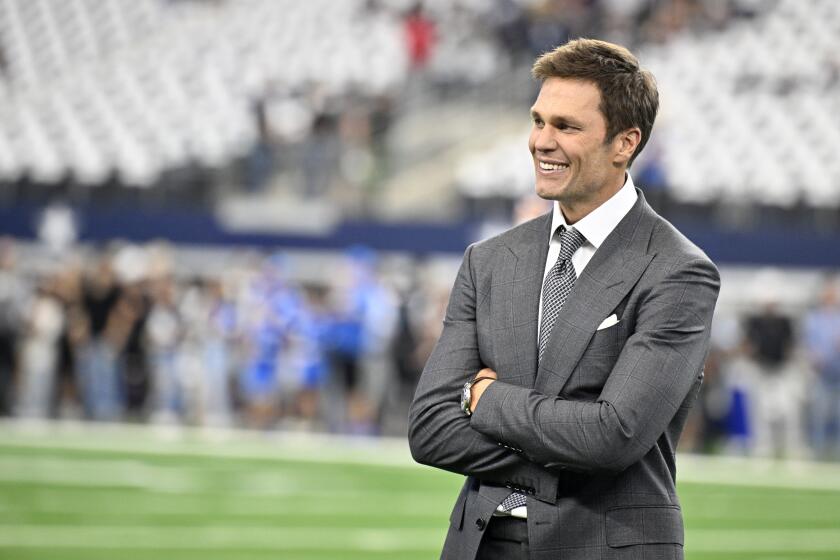He Gets His Own Vote : Baseball: Former Baltimore Oriole pitcher Jim Palmer believes he has earned the right to be in Hall of Fame.
KEY BISCAYNE, Fla. — Early next week, he is expected to enter the most exclusive fraternity in sports, the baseball Hall of Fame. But right now he’s only another biker, tennis player and golfer using the facilities on this picturesque island just a few miles from downtown Miami.
It’s just the way Jim Palmer likes it. The talk is about backhand winners, birdie putts and what is happening in the world outside of sports.
Palmer is realistic about his expected nomination to the Hall of Fame, but if there is any anticipation or excitement, he is doing a good job of hiding it. “If you’re asking me if I think I’ll make it, yes I do, compared to others who have gone in, but it’s a lot like a political election,” said Palmer. “A candidate might think he’s run a good campaign, but you never know what’s going to happen when people walk into a voting booth or fill out a ballot.
“My numbers are there, and there’s nothing I can do to them now. I can’t go out and win any more games. Maybe it’s a self-guarded attitude, but I can’t worry about something over which I have no control.
“Making the Hall of Fame is the greatest thing that can happen to a player,” he said. “It may change my life somewhat, but I don’t want my life predicated on change.”
In many ways it’s difficult to believe Palmer’s career ended on a rather inglorious note in 1984. After compiling a 268-152 record and a 2.86 earned run average over 19 seasons, he was guided into a forced retirement by the Baltimore Orioles. It was a gut-wrenching decision on both sides, and the emotion lingers to this day.
“We were playing so poorly; I was 0-2, Scotty, Flanny and Bod were all struggling,” recalled Palmer, referring to Scott McGregor, Mike Flanagan and Mike Boddicker.
But Palmer was the only one of the four who was 38 and the only one who had a discussion with Edward Bennett Williams, the team’s late owner. “Ed Williams told me, ‘My baseball people tell me you can’t pitch anymore,’ and I told him, ‘If you’re paying those people, you should listen to them.’
“But I also told him that traditionally with the Orioles, older players always played a role other than winning games,” Palmer said. “I didn’t get the chance to do that.”
Palmer felt then, and does to this day, that he still had some life left in that wondrous right arm. But if there was some hurt at the time, there is no lingering bitterness.
He could have gone somewhere else to continue his quest for 300 wins, once an avowed goal, but decided against it. “It was the wrong time to go somewhere else to win a few more games,” he said. “I’d spent my entire career with the Orioles, and I really didn’t want to go anywhere else. Had circumstances been different, if I hadn’t had other alternatives, maybe I would have done it, but it was time to make a decision.
“When you play baseball for 20 years a lot of sacrifices have to be made by your family, your kids and yourself. There are a lot of positives to being a baseball player, but there are some negatives, too.
“The lifestyle is not conducive to a good marriage. I looked around and saw that my marriage had already disintegrated.”
He had been divorced from Susie for about 2 1/2 years at the time and his daughters, Jamie and Kelly, were 17 and 15, respectively.
“When you play 20 years you have to be selfish and there are a lot of times when you’re not around as much as you’d like,” he said. “The time had come when it wasn’t worth having to make sacrifices anymore. All of a sudden 300 wins didn’t seem important and 32 (more) is a lot when you’re 38 years old.”
Palmer’s daughters have always been central figures in his life, and remain so as young adults. (Jamie is a graduate of Hobart College and lives in the Boston area. Kelly is a junior at the University of Colorado.)
“When you’re a ballplayer, people tend to put you on a pedestal,” he said. “But they know the real me. They know what the real world is like.
“I think Susie and I did a good job in that regard. They certainly knew their dad was a player -- but to them I was a father.”
The fact that Palmer was able to make an easy transition to the broadcast booth with ABC, and had his lucrative underwear endorsement that is still in effect, made the retirement decision easier. “My contract with ABC was coming to an end and they wanted to know about my plans for going full-time, so in that regard it (his retirement) was convenient.
“In some ways I didn’t have the luxury that somebody like Don Sutton or Nolan Ryan had -- of going to other teams where all they expected was what they could get out of you. But I don’t regret that.”
The expectations for Palmer undoubtedly were higher in Baltimore than they might have been somewhere else. That’s what happens when you win 20 games eight times, lead the league in earned run average twice and in innings pitched four times, compile an 8-3 postseason record, make six All-Star teams, win three Cy Young awards and four Gold Gloves.
“Some people felt I couldn’t deal with the fact that I couldn’t be the pitcher I had been,” Palmer said. “But to the contrary, I thought it was more the other way around -- that others had trouble dealing with it.”
But that is all part of a brilliant past. Palmer is already well into the second phase of his life. His broadcasting career is such that he is pondering three options -- remaining with Baltimore’s WMAR-TV to work Orioles telecasts, accepting a firm and very attractive offer to serve as analyst for the Toronto Blue Jays, and a possibility of working on ESPN’s expansive major-league coverage that starts this coming season. It’s possible that Palmer might combine a small ESPN package with one of the other two options.
“Obviously the ideal situation would be limited travel,” said Palmer, who expects to make a decision on his TV future within two weeks. “The Toronto offer is firm, and they seem anxious for me to come up there, but their schedule (two games per week) would require 50 separate trips.”
Last year Palmer did play-by-play for the first time, and he said the transition wasn’t an easy one. “I can’t be Chuck Thompson. I don’t have Chuck’s voice for one thing. But I think I got better as the season went on and I think eventually I could grow into doing both,” he said about combining play-by-play with color commentary.
Palmer’s personal life also has changed in the last few years. He is engaged to Joan Pearlstone and expects to marry early this spring.
In fact it is Pearlstone who probably has the most anticipation about the forthcoming Hall of Fame announcement. “I promised her a trip to Europe if I went in on the first ballot,” said Palmer, “and she’s already making plans.”
Palmer’s expected entrance into the Hall of Fame will be an unneeded reminder of his tremendous athletic skills. He grew up in Los Angeles and Scottsdale, Ariz., and he signed with the Orioles out of high school in 1963, but only after a spectacular summer during which he played in a semipro league against college players.
Up until that point he was headed to college -- as a basketball player. “I would’ve gone either to Arizona State, UCLA or USC,” he said. “At the time I thought my best sport was basketball, and I would have played both.”
Had he decided to go to UCLA, Palmer would have arrived at the start of John Wooden’s unprecedented run of 10 NCAA titles -- and he might have played with Lew Alcindor (Kareem Abdul-Jabbar) for at least one season. “That would have been an adventure,” said Palmer. “I would have been a passing guard, getting the ball to the big guy.”
Instead he accepted a $50,000 bonus from the Orioles, which he said was a tough decision. “You give up a lot of your youth,” he said. “It was the biggest decision I had to make up until that point.”
He married shortly thereafter, soon became a permanent resident in Baltimore and struggled through some trying times early in his career. He lost the 1967 and 1968 seasons to injury -- prime years that almost certainly would have lifted his victory total beyond 300.
It may seem like his career ended only yesterday, and at 43 he still looks like he could have a few years left, but late Tuesday night Palmer should get the word that he has reached the pinnacle of his profession.
Jim Palmer, Hall of Famer, is the ultimate accomplishment. It doesn’t get any better than that.
More to Read
Go beyond the scoreboard
Get the latest on L.A.'s teams in the daily Sports Report newsletter.
You may occasionally receive promotional content from the Los Angeles Times.










